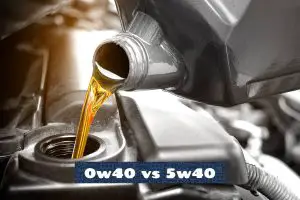The Nissan Rogue, revered for its reliability and efficiency, has etched its position in the world of compact SUVs. However, maintaining this performance requires a vital ingredient: the right type of engine oil. Not all oils are created equal and your selection can directly impact your Rogue’s longevity, fuel efficiency, and performance.
The Nissan Rogue predominantly uses synthetic engine oil. Depending on the model year, it typically requires:
- 2008-2013 models: 5W-30
- 2014-2020 models: 0W-20
- 2021-2023 models: 0W-20
This guide will explore how the Nissan Rogue’s engine design and model year influence oil selection, and why Nissan’s recommendations matter. Additionally, we’ll discuss the impact on fuel efficiency and common questions around the Rogue’s oil type.
Types of Engine Oil
In order to make an informed decision about the best oil for your Nissan Rogue, you first need to understand the three primary types of engine oil: conventional, synthetic, and synthetic blend.
1. Conventional Oil
Conventional oil, also known as mineral oil, is the original engine lubricant. It’s derived from crude oil that has been refined to remove impurities. This type of oil is often a reasonable choice for vehicles with simple engine designs and regular driving conditions.
However, it doesn’t perform as well under extreme conditions as its synthetic counterparts. It has a limited temperature range and breaks down more quickly, meaning it needs to be replaced more frequently.
2. Synthetic Oil
Synthetic oil is the result of a more sophisticated refinement process. It’s engineered to have a uniform molecular structure which gives it superior attributes. Synthetic oil offers better thermal stability, ensuring optimal performance under high heat conditions, and flows more easily at low temperatures, reducing engine wear during cold starts. It also keeps your engine cleaner due to its resistance to forming sludge.
These benefits contribute to longer engine life and potentially better fuel economy, attributes that modern vehicles like the Nissan Rogue can greatly benefit from.
3. Synthetic Blend Oil
Synthetic blend, as the name suggests, is a mix of conventional and synthetic oil. It offers improved performance over conventional oil at a lower cost than full synthetic. It provides a balance of good low-temperature performance and heat resistance. While not as optimal as full synthetic, for some engines and driving conditions, it’s an effective and cost-efficient choice.
What Works Best for Nissan Rogue?
For the Nissan Rogue, synthetic oil usually offers the best performance. It protects the engine at a wide range of temperatures, providing fluid lubrication during cold starts and maintaining stability during hot conditions. Synthetic blend is a decent alternative, providing better protection than conventional oil, but not quite matching the full performance of synthetic oil.
Which Oil Type Lasts Longer?
Synthetic oil offers superior longevity. It maintains its lubricating properties and doesn’t break down as quickly under high temperatures as conventional oil. This means you can drive more miles between oil changes, saving you time and potentially reducing your environmental footprint. Synthetic blend, while not as long-lasting as full synthetic, still offers a longer oil change interval than conventional oil.
Nissan Rogue Oil Type
The engine oil type used in your Nissan Rogue is like the life force of your vehicle, reducing friction, minimizing wear and tear, and improving fuel efficiency. But what type of engine oil does the Nissan Rogue require?
Different models of the Nissan Rogue require different types of engine oil, primarily due to changes in engine design and manufacturing standards over the years. Here’s a quick breakdown:
- 2008-2013 Nissan Rogue models typically use 5W-30 synthetic oil.
- 2014-2020 Nissan Rogue models require 0W-20 synthetic oil.
- 2021-2023 Nissan Rogue models also use 0W-20 synthetic oil.
The numbers and letters in the oil type represent the oil’s viscosity, which is a measure of how easily it flows at different temperatures. The “W” stands for winter, indicating the oil’s flow at cold temperatures. The second number signifies the oil’s thickness at higher temperatures.
How Nissan Rogue’s Engine Design Influences Oil Type

Engine design significantly influences the type of oil used in any vehicle. The Nissan Rogue is no exception, with its engine architecture and operating conditions dictating the use of certain oil types over others.
Nissan Rogue’s Engine Characteristics
The Nissan Rogue employs a modern internal combustion engine, specifically a 2.5L inline 4-cylinder engine. These engines are compact, efficient, and designed to operate under a variety of conditions. To keep them running smoothly, a high-quality, low-viscosity oil like synthetic 0W-20 or 5W-30 is recommended.
Role of Engine Components
In the Nissan Rogue’s engine, various components interact with engine oil, each having its own lubrication needs:
- Pistons and Cylinders: The interaction between pistons and cylinders creates high temperatures and pressure. Synthetic oil, with its superior high-temperature stability and ability to maintain a protective layer between these surfaces, is ideal.
- Valvetrain: The valvetrain includes components like the camshaft and valves, which need effective lubrication to function smoothly. Synthetic oil, thanks to its flow characteristics, can easily reach and lubricate these parts, even in cold starts.
Certain Nissan Rogue models are equipped with a turbocharger, which increases engine power by forcing more air into the combustion chamber. Turbocharged engines generate higher temperatures and demand oil with excellent heat resistance, another reason synthetic oil is a preferred choice.
Engine Evolution from 2008 to 2013
During this period, the Nissan Rogue used a version of the 2.5L 4-cylinder engine designed for slightly thicker oil. Hence, the recommended oil type was 5W-30 synthetic, which offers good protection and performance at a wide temperature range.
Engine Evolution from 2014 Onwards
From 2014 onwards, the Nissan Rogue engines were optimized for better fuel efficiency and lower emissions. These enhancements required a thinner oil that could flow more easily, reducing friction and improving efficiency. Consequently, Nissan began recommending 0W-20 synthetic oil for these models.
FAQs
1. How often should I change the oil in my Nissan Rogue?
The frequency of oil changes in your Nissan Rogue largely depends on the type of oil used and your driving habits. If you use synthetic oil, you should change it approximately every 5,000 miles. However, if your driving habits include frequent short trips, heavy traffic driving, or driving in dusty conditions, you might need to change the oil more often. It’s always best to refer to your vehicle’s owner manual for the most accurate information.
2. What happens if I use the wrong oil type in my Nissan Rogue?
Using the wrong oil type in your Nissan Rogue can have several negative effects. If the oil is too thick, it may not flow properly to lubricate the engine components, especially during cold starts. This can result in increased wear and tear. Conversely, if the oil is too thin, it may not adequately lubricate the engine under high heat, leading to increased friction and potential damage.
3. Can I switch from conventional oil to synthetic oil in my Nissan Rogue?
Yes, you can switch from conventional oil to synthetic oil in your Nissan Rogue. Synthetic oil offers superior performance compared to conventional oil, providing better protection for your engine, potentially improving fuel efficiency, and often allowing for longer intervals between oil changes.
However, once you switch to synthetic, you should stick with it for consistent performance. As always, refer to your vehicle’s owner manual for specific recommendations.
4. What’s the difference between 5W-30 and 0W-20 oil, and why did Nissan change its recommendation?
5W-30 and 0W-20 oil differ in viscosity, or flow characteristics. 5W-30 is slightly thicker and ideal for a wide range of temperatures, while 0W-20 is thinner, flowing more easily in cold temperatures and reducing engine friction.
Nissan shifted its recommendation to 0W-20 for models post-2013 due to engine design optimizations. These newer engines were designed for improved fuel efficiency and lower emissions, which can be enhanced by using thinner, lower viscosity oil like 0W-20.






